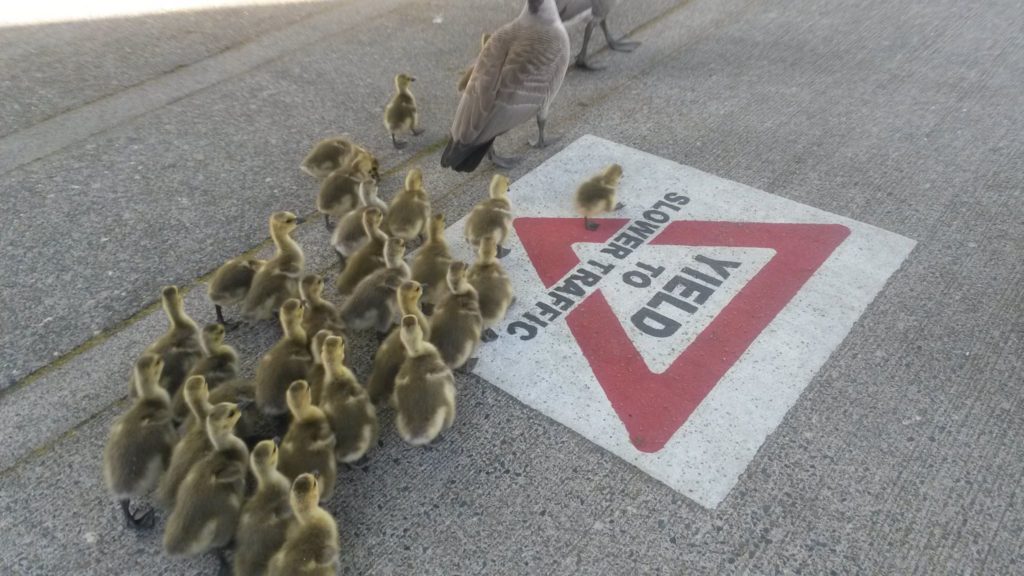Duck – Duck – Eagle
Remember the game we played when we were little? The one who was “it” walked around the outside of a kiddo-circle tapping every next person on the head. “Duck.” “Duck.” “Duck.” “Duck.” “Duck.” “GOOSE!”
Then the running commences. The “it” child takes off like a shot – running around the circle. The “goose” child tries to catch them. If caught, “it” stays “it” – if not, the new “it” starts making the duck/goose rounds.
There’s some disagreement about where the game came from, but enough folks associate the set-up with angry bully geese to make that story plausible. Something like, “any child in the position of hearding water fowl ought to know the difference between harmless ducks and potentially violent geese.” Well, yes. A bit utilitarian (protestant?) as an explanation, but the bully-explanation is the one I’m thinking of here.
Call a bully a bully – and run for safety.
There’s really no trouble with that structure. After all, it keeps the game going. But the game may be an analogy worth considering for the way energy of public discourse is going these days.
Since well before November 8, 2016, the already well-honed reflex was activated among Americans of all kinds. The righteous impulse to stand in opposition – each claiming the other is bullying.
The duck-duck-goose game may most easily apply to the visual news and entertainment media – the “duckish” folk who call out bullies from their very well-paid and protected safe places on sound stages. Thinking Bill Maher – Kieth Olberman – Sean Hannity – Bill O’Reilly. Oh, guys ….
Some of their positions I might agree with – others not, but my point is they all thrive off of keeping the game going – and like the children’s circle game, the designated “Goose” (the one being called “bully”) changes to extend the play.
It would ruin the fun to listen to each other for reasons other than crafting clever self-aggrandizing come-backs. Listening is decidedly not the point. And with disturbingly reflexive consistency, lots of us agree to keep the game going by fueling the myopic animosity.
“I’m your victim .. interruption .. NO, I’m yours.”
It would, of course, be foolish to presume conflict ought to be erased from the real work of listening to each other. We must know the landscape of our dialogue – of our points of disagreement AND our points of agreement.
It would be even more unwise to fail to call out real bullies – and there actually are plenty of those. They need to be held to civil and respectful behavior. But each of us needs that. Because we really are getting nowhere, except perhaps closer to mutual destruction, every time we hook up to mainline whatever addictive neuro-physiological buzz comes with the aggression of siding with one polarity or the other.
The metaphor is a bit strained. The harmless children’s game of Duck-Duck-Goose, is just that – harmless.
About an hour ago we spotted a mama Bald Eagle circling over the river valley. Watching. Seeing. Knowing things that are possible to know outside impulsivity.
Bullying is sustained by impulsivity. The impulse of the bully. The impulse of the victim. In the moment of perpetration, the elevated view is near impossible to gain. I’m not suggesting that level of sainthood – although it has certainly served.
Like calling “Goose!” – call a bully a bully. Run away to whatever respite is available. And when the dust settles, when there’s space, ask other questions. Bryan Stevenson, the vital prison reform leader, reminds us, “You are not your worst act.” Neither is the goose. Neither is the bully.
I’m really not talking rose colored glasses here. Those don’t serve anything but to perpetuate bullying from a position of passivity. Intead, I’m suggesting each of us can benefit from noticing when we’re stepping full force (usually impulsively and unconsciously) into perpetuating the game with its profound problems of opposition. And when we notice, we can – and must – take the opportunity to step out. To rise above.
Internet activist Jen Hoffman has taken to reminding the recipients of her weekly action checklist of ways for stacking the deck for Eagle vision:
Whenever possible, avoid getting mired in hate, resentment, and middle-of-the-night fretting. Instead, focus on what you *can* do. This includes taking action from my checklist, but also getting sleep, limiting screen-time, and doing what helps you feel like a loving, resourceful human. Don’t give 45 any more of your precious energy than necessary. Use it instead for creating more good when you can.
Pro 45 or not, each and every one of us are in it. Right here in this circle of being humans on Earth. Even in our moments of Eagle perspective, there’s no escaping our involvement with humanity. Its chaos and its beauty.
And still, in the everyday of hanging out in flocks, most of us know, deep down that our differences really aren’t the problem. Running, playing, even competing aren’t the problem. It’s locking in on singular bully/victim storylines – “I’m your victim!” “NO, I’m yours!” – that keeps us from knowing and being known in ways that could salvage the whole species.
The stakes, these days, are only that high.
 Clare Consultation, LLC
Clare Consultation, LLC
I have always held the eagle, hawk as my favorite fellow creature and my favorite metaphor. I like your perspective and appreciate any sanity in this self-perpetuating game.